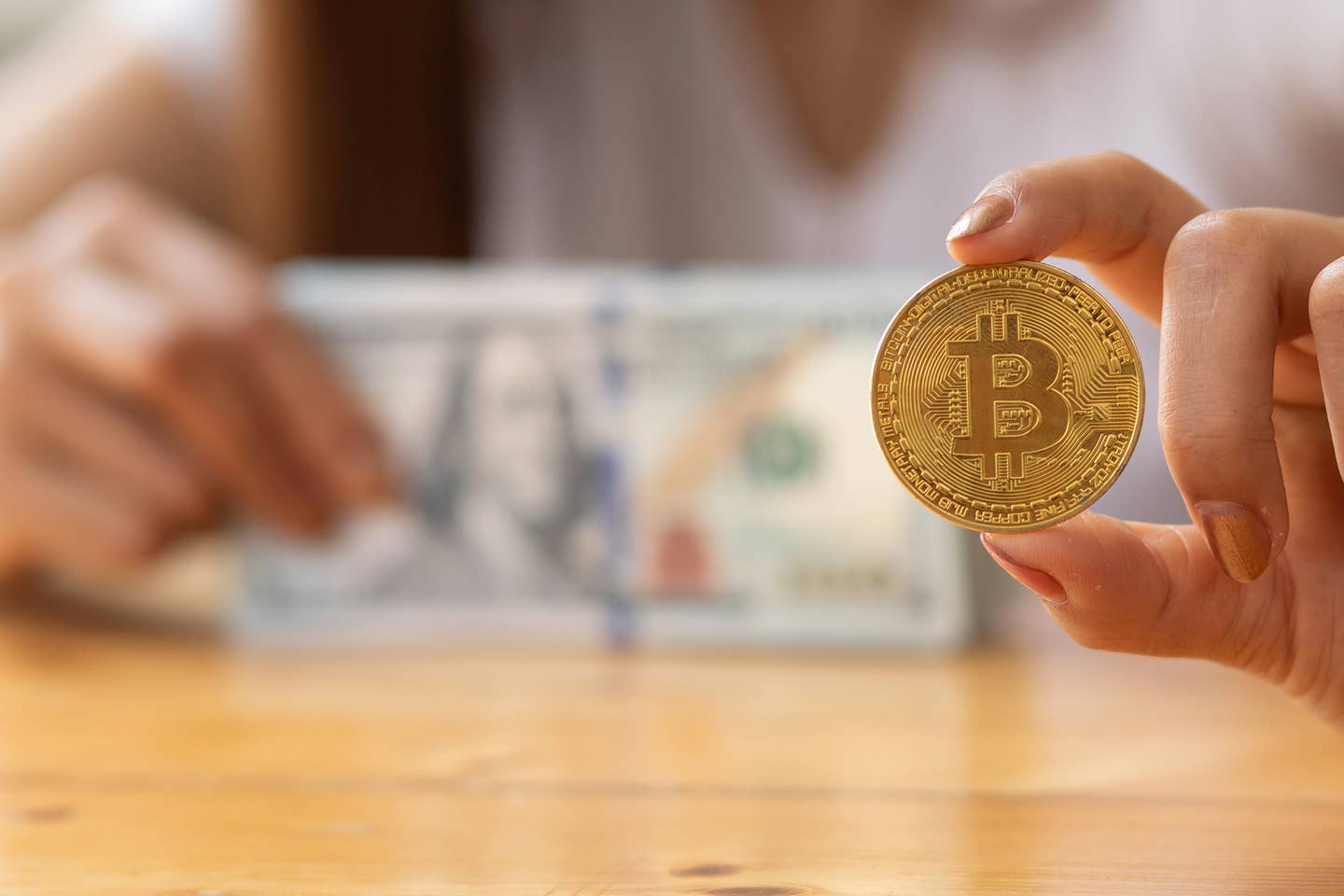High Finances: Flying High on Bitcoin
Cryptocurrency has attracted a lot of attention lately. Our financial pilot—an admitted nerd—cuts through all the hype.

Jason Depew says when implemented properly, cryptocurrency improves almost everything about using money.
I admit: I’m a nerd. I have a degree in computer engineering, and I’ve read all eight books in The Expanse series. One recent technological development that gets me excited is cryptocurrency.
We’re going to take a break from talking about traditional investing and retirement accounts to discuss crypto because I worry it gets too much of the wrong kind of attention.
We’ll start with an explanation of what cryptocurrency actually is. Then, we’ll look at how you might—or might not—use it.
Crypto is Awesome!
Crypto is the future of money. When implemented properly, it improves almost everything about using money. Individuals can send crypto across borders without paying exorbitant fees to intermediaries. Crypto lets people in poor countries save money in a meaningful, inflation-resistant format. It makes our centralized banking system irrelevant.
If you’re interested in a real-world case study for a practical implementation of cryptocurrency, I recommend Andy Weir’s fantastic second novel, Artemis.
In this story, human society on the moon uses a cryptocurrency called SLGs (pronounced “slugs”). Each slug represents one gram of cargo transported from the Earth and soft-landed on the moon. I love this examination of cryptocurrency because it gets past all the hype surrounding it today. Weir tells an exciting, fast-paced, science-heavy murder mystery...on the moon. Slugs just happen to be part of the setting. It’s brilliant!
How Crypto Works
If you’re interested in cryptocurrency, you need to read (and understand) the original Bitcoin white paper, published under the pseudonym Satoshi Nakamoto, before you start dabbling seriously. However, here’s a 35,000-foot version:
All cryptocurrency transactions are recorded on a public ledger, called a blockchain. For example, if I got a very large raise there could be an entry saying:
- Flying Media Group paid Jason Depew one Bitcoin (BTC) to write an article about Bitcoin on December 31, 2021.
However, in order to protect privacy, our identities are masked. The actual entry would show the serial numbers for each of our Bitcoin wallets (accounts) instead.
- Wallet #48327183 paid 1 BTC to wallet #28959280 on December 31, 2021.
Don’t assume you can use this anonymity to avoid taxes, sell drugs, or hire assassins though. Wired has a fascinating two-part saga about how the U.S. government identified a hacker called The Dread Pirate Roberts, arrested him, and took down Silk Road—a dark web marketplace—by tracing Roberts’ transactions on the Bitcoin blockchain.
“Crypto relies on computers, owned and operated by concerned individuals, to process financial transactions over the internet.”
In order to prevent fraud, this ledger also records the serial number of the Bitcoin used for the payment. Yes, every cryptocurrency coin has a serial number. In fact, each system has numbers for tracking tiny fractions of each coin. The smallest denomination of a Bitcoin is one hundred-millionth of a full coin. (For this particular type of cryptocurrency, that denomination is nicknamed a Satoshi, after Bitcoin’s inventor.) The blockchain records the movement of every single Satoshi.
Using wallet serial numbers for anonymity and coin serial numbers for verification, the entry for my paycheck looks more like:
- Bitcoin wallet #48327183 paid 1.000000000 BTC (serial number 84872728484747) to Bitcoin wallet #28959280 on December 31, 2021.
Things get a little more complicated from here. Some ingenious encryption protocols are used to prevent tampering while still allowing everyone to see the details of each transaction.
Trustless Security
The most fascinating aspect of cryptocurrency is that it operates on a “trustless” system, unlike our current banking system. We trust governments to mint legal tender, but only in reasonable amounts. We trust our banks to safely store and transfer our funds. Without these third-party authorities, our banking system couldn’t exist. Cryptocurrency succeeds without any of that.
Crypto relies on computers, owned and operated by concerned individuals, to process financial transactions over the internet. Each time one node in this network records a translation, it broadcasts that news out to all the other nodes. Eventually, each computer gets word of every transaction.
Since the details of these transactions are encrypted, it’s extremely difficult for anyone to commit fraud. There is no such thing as: “Your money never arrived,” or “The check’s in the mail.” Everyone on the network can see whether a transaction happened.
In theory, it is possible to present an alternate set of transactions to the network in an attempt to propagate some Bitcoin “fake news.” However, since the network is made up of many computer nodes, the majority will see that your fake transaction doesn’t match the real ledger entries everyone else saw. As long as the fraudsters control less than 50 percent of the computers in the network, the system automatically rejects the false transaction record and keeps everyone’s money safe.
The major cryptocurrency networks now include thousands of computers owned by individuals all over the world. It would be extremely difficult for someone to assemble the majority required to do any harm. This allows the network to protect all transactions by enabling everyone to see what’s happening in the blockchain ledger at all times.
Protecting Your Crypto
It’s critical to note that once you set up the password for a cryptocurrency wallet, you must keep it safe! Anyone with the password can steal your money. No police department or government can get your money back either.
If you forget your password, you’re simply out of luck. Stefan Thomas has a wallet containing Bitcoin worth upwards of $250 million, but has forgotten his password. He has two more guesses to remember it, or those coins will effectively be lost forever.
This also means your funds are only safe if you keep them stored in a personal system and don’t give anyone else access to your password. This makes buying or selling cryptocurrency perilous.
Unless you’re mining crypto yourself (a topic for another day) you must trade real-world money (dollars) for cryptocurrency. Several online cryptocurrency exchanges provide this service.
It’s OK to use one of these exchanges to buy or sell cryptocurrency. However, only a great fool would leave their funds in that exchange for one moment longer than necessary. The problem is that in order to execute your money transfers, these websites must set up their own cryptocurrency wallet on your behalf. The exchange has to store an (encrypted) copy of that wallet’s password on their servers. If a hacker can get into the website’s database, they can access the passwords to every wallet in the system. This has happened over and over again, costing people like you and me millions.
If you use an online exchange to buy cryptocurrency, you should immediately transfer those funds into a personal cryptocurrency wallet on a phone, computer, or other personal device. The password for that personal wallet must be stored securely. Do not put the password on a computer system that is vulnerable to hacking.
If you want to exchange cryptocurrency for traditional money, you should only transfer it from your personal wallet immediately before exchanging. Leave it in the hands of the exchange service for the shortest time possible.
Next time: Does crypto make sense as an investment?
Editor’s Notes: Investing in the stock market doesn’t guarantee returns. The opinions expressed here do not constitute endorsement by FLYING.

Sign-up for newsletters & special offers!
Get the latest FLYING stories & special offers delivered directly to your inbox






